Portland Made: Spooltown Soft Goods Factory
Monday, June 01, 2015
Coming Fall 2015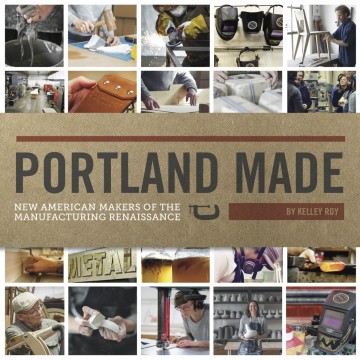
As the founder and owner of ADX, I have had the good fortune to be at the helm of an extraordinary experiment in urban life. Portland is at the forefront of a New American Manufacturing Revolution, and ADX has been an important catalyst in shaping the handcrafted goods movement. I am constantly asked—by Portlanders, non-Portlanders, politicians, non-profits, other creatives who want to start similar movements in their own cities—what this creative renaissance looks like. This book is the answer.
One of the companies featured in Portland Made: New American Makers of the Manufacturing Renaissance is Spooltown. Portland Made contributing writer, Peggy Acott, recently sat down with Sara Tunstall and Dana Hinger of Spooltown to talk about the rapid growth their are experiencing and their niche in Portland's Maker Movement.
Being on a conference call with Sara Tunstall and Dana Hinger, the co-owners of Spooltown, is like a jolt of caffeine, in a good way. Their energy, enthusiasm and confidence infectiously buzz and hum, and I can only imagine what being in their company must be like. A double espresso.
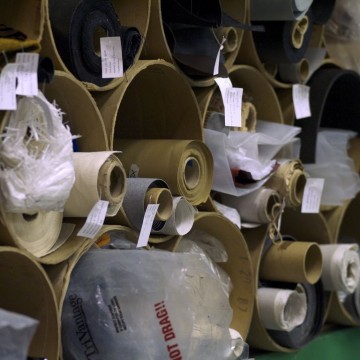
Spooltown materials
Their business has been on an upward trajectory that Hinger describes as like “riding a wild elephant.” It led them to move from their shared warehouse location on N. Williams Avenue to a warehouse in the inner Southeast’s light industrial and distillery hub, a space twelve times larger – an open expanse of 6500 square feet – and they say they can already feel themselves “almost out of space.” The workspace houses sixteen to twenty employees at any given time; they now are able to produce sewn soft goods for eighty to one hundred clients a year. “We would love to talk with everyone,” says Tunstall, amazed by how many people are out there with good ideas and a drive for making. “But there are simply not enough hours in a day.” So over the past year and a half they have been refining their space, staffing, and processes for the services they offer.
Spooltown is in a uniquely niche manufacturing market, especially in the Pacific Northwest, and being based in Portland has its advantages and challenges. “People here are doing things differently,” says Tunstall. “The approach to making is from the ground up, rather than from the top down,” meaning that there are no major institutions driving manufacturing; Portland’s creative impetus is from individual and small company makers and designers who just “stand up and start making things.” But while this innovative and grassroots approach to its maker movement is invigorating, the lack of a built-in infrastructure like that which exists in Los Angeles and other major garment and accessory production cities, is a major challenge. It is hard to navigate as a production business here without that sort of fundamental support chain. “You can’t just go out and pick up sewing machine parts,” for example. But this is where Hinger and Tunstall want to be. Here they can help provide a sense of community and viable local jobs, keep alive their important mission of making American manufacturing visible (a 12’ aluminum garage door has been replaced with a glass roll up door that allows those passing by to see the making). But maybe most importantly, they can help new designers with developing the skills and knowledge they need to achieve successful manufacturing of their product.
This education component is fundamental to Spooltown, and the need was apparent when, two years ago, they offered a workshop on “How to Work With Manufacturers.” They expected about twenty people to attend, but were astounded when more than 150 showed up and they had to turn people away.
Clearly, Tunstall and Hinger had found their niche. But even with the considerable expansion that has occurred (and which doesn’t show any signs of slowing), Tunstall and Hinger are cautious. “We don’t want to become a faceless factory where we don’t know our employees.” They are pursuing the goal of maintaining a slower, steady and sustainable growth, in part made up of a core of ongoing and repeat clients.
And though they had originally thought Spooltown would be a much more regionally based business, makers and designers from all over the county and internationally are now regularly contacting them. They have clients in several states from coast to coast, as well as in Vancouver, BC.
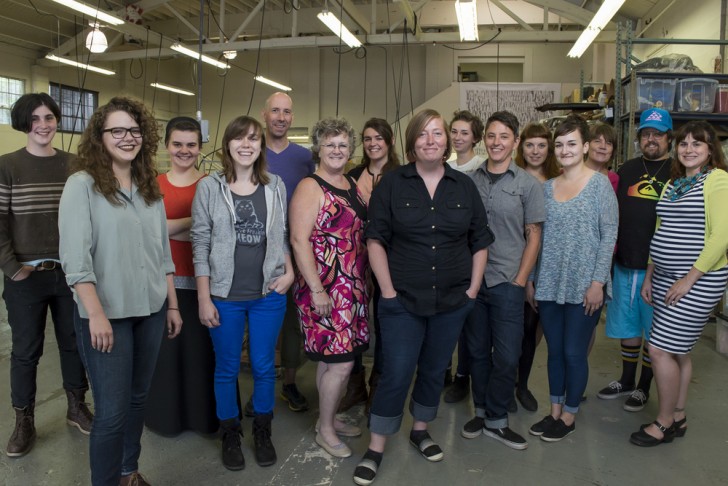
Folks at Spooltown
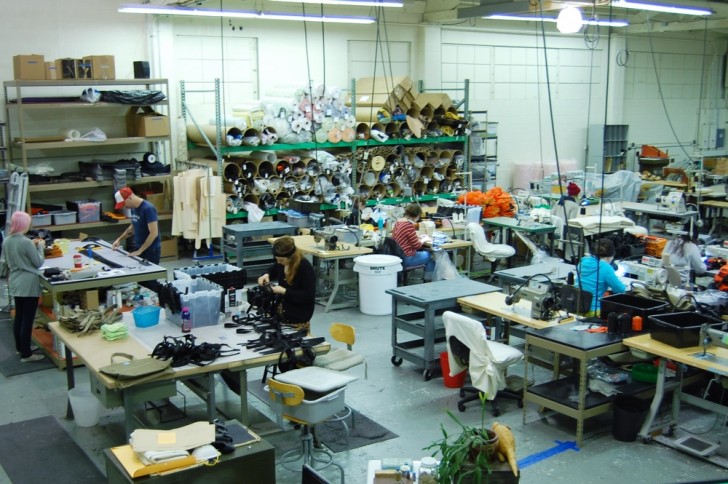
Spooltown production
_____________________________
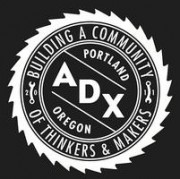
Kelley Roy is the founder of ADX, a 14,000 square foot Makerspace where artists and designers work along side each other to prototype and launch new product lines. ADX is also open to the general public and teaches people of all ages how to make. And if you don't want to do it yourself, you can hire ADX to make it for you. For more information check out adxportland.com.
Portland Made is a digital storytelling platform and advocacy center for Portland's Maker Movement. We do 2 features a month on Portland Makers; connect makers with more local, national and international markets; connect makers with local professional and manufacturing resources; advocate for makers with politicians at all levels of government; work with PSU on an annual survey that captures the economic power of the Maker Movement; help makers find real estate; and promote Portland makers with local and national media.

Related Articles
- Portland Made: Straight Razor Maker Scott Miyako
- Portland Made: Woodworker Josh Mabry
- Portland Made: Working Together ADX + Togetherfarm
- Portland Made: Zenger Farms, Growing the Next Generation of Farmers
- Portland Made: Product Innovator, Sam Pardue of Indow
- Portland Made: Oregon Kombucha Starter Kit
- Portland Made: Food Incubator, Kitchen Cru
- Portland Made: Kim Malek of Salt and Straw
- Portland Made: Lamp Designer Shannon Guirl
- Portland Made: Leather Craftsman Geoff Franklin
- Portland Made: A Focus on Local Fashion




 Delivered Free Every
Delivered Free Every
Follow us on Pinterest Google + Facebook Twitter See It Read It